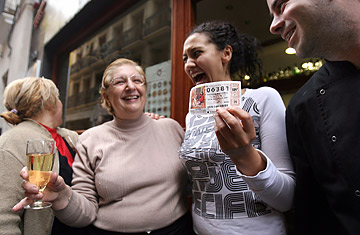
Some of the winners of last year's Christmas Lottery in Spain celebrate. The annual lottery has been held since 1812.
To kick off the Christmas season, the U.S. holds the Macy's Thanksgiving Day Parade with Santa Claus bringing up the rear. Black Friday shopping gets underway bright and early the following day and just over a week later comes the lighting of the nation's most famous tree in Rockefeller Center. But Americans might learn a thing or to from the Spaniards; although the Christmas season doesn't really get started until Dec. 22, they do it in style. On that date every year, children from the San Ildefonso School (once an orphanage for boys) sing a three-hour Gregorian chant in which they pick and announce the winning numbers in the world's oldest and — with a total of $3.3 billion given away — by far its biggest lottery. An estimated 3 in 4 Spaniards and thousands of foreigners purchase tickets in the lottery — with more than a million participants expected to take home some sort of cash.
With odds of winning money as low as one in three, the lottery has continued to thrive since its inception during the Spanish War of Independence. Cortes de Cadiz, the country's legislative body, introduced the game in 1812 in order to increase state income and held the very first drawing on March 4 that year. Other lotteries had existed in the country since 1763, when King Carlos III began using them to finance Spain's side in the Napoleonic War, among other ventures. It was he who first began the tradition of having orphan boys draw the winning numbers.
The El Gordo drawing has other beneficiaries besides the lucky winners: more than $80 million of the money collected goes to charities such as the Red Cross. The hefty payouts are thanks in part to the high price of an El Gordo ticket, or billete. One whole ticket costs about $280, although each ticket can be divided into 10 chances, or "decimos", with the same printed number, and split among several people. Every year, groups of friends, neighbors and co-workers all over the country pool resources for a chance at one of the millions of prizes. Over the course of the six months while the tickets are on sale, the "decimos" get divided and subdivided so that more people can try their luck for as little upfront money as possible. In return, they have a chance of winning a lump sum, tax-free payment up to about $4.3 million for the top prize.
The prize money has touched people from all walks of life. In 1930, for example, as the world sank deeper into the Great Depression, part of that year's biggest prize of 30,000,000 pesetas (about $3 million) went to a garage owner and his mechanics, who had all chipped in 22 cents to gain about $1,600 each. A portion of the fourth largest prize, about $100,000, went to Ramon Franco, the brother of Francisco Franco, who would later become Spain's long-reigning dictator. The game has had its share of critics as well: Spanish households spend about 2% of their budget on lottery purchases and other forms of gambling, one of the highest rates in Europe.
Unsurprisingly, El Gordo (literally, "the fat one") has drawn its fair share of scams; in some years bogus letters were sent out telling recipients that they have won a large sum of money in the Christmas drawing but would have to keep the prize confidential and pay fees and taxes before claiming the cash.
As the saying goes, though, you've gotta be in it to win it, and an estimated 32 million people will be in it this year as the San Ildefenso children draw numbers from large gold drums in the Grand Salon of the Spanish National Lottery in Madrid. One of the drums contains thousands of wooden balls each with a unique ticket number. The smaller vessel contains 1,787 balls displaying a cash amount. Waiting crowds will yell "Gordo! Gordo!" as each prize is matched up with a ticket number, and hope for a little extra stimulus money amid the global financial crisis.
